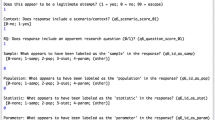Abstract
The research presented explores various ways in which introductory statistics students used dynamic statistical software to generate models and simulations as tools to support their thinking and to help them answer informal statistical inference questions. Modern computing technology has changed the nature of statistics as a discipline. Introductory statistics courses need to change if they are to keep pace with modern innovations in statistics. This research report focuses on 16 students enrolled in an elementary statistics course. The course implemented CATALST curricula and the extensive use of TinkerPlots™ software in order to investigate students’ successes and challenges as they engaged with the technology as a tool for answering informal statistical inference questions.
Access this chapter
Tax calculation will be finalised at checkout
Purchases are for personal use only
Similar content being viewed by others
References
Ben-Zvi, D., & Friedlander, A. (1997). Statistical thinking in a technological environment. In J. B. Garfield, & G. Burrill (Eds.), Research on the role of technology in teaching and learning statistics. Proceedings of the 1996 IASE Round Table Conference (pp. 45–55). University of Granada, Spain, 23–27 July, 1996. International Statistical Institute Voorburg, The Netherlands.
Chance, B., Ben-Zvi, D., Garfield, J., & Medina, E. (2007). The role of technology in improving student learning of statistics. Technology Innovations in Teaching Statistics, 1(1), Retrieved from http://escholarship.org
Chance, B., delMas, R., & Garfield, J. (2004). Reasoning about sampling distributions. In D. Ben-Zvi & J. Garfield (Eds.), The challenge of developing statistical literacy, reasoning, and thinking (pp. 295–323). Dordrecht, The Netherlands: Kluwer.
Cobb, G. W. (2007). The introductory statistics course: A Ptolemaic curriculum? Technology Innovations in Statistics Education, 1(1). Retrieved from http://escholarship.org
Fitzallen, N., & Watson, J. (2010). Developing statistical reasoning facilitated by TinkerPlots. In C. Reading (Ed.), Data and context in statistics education: Towards an evidence-based society. Proceedings of the Eighth International Conference on Teaching Statistics (ICOTS8, July, 2010), Ljublijana, Slovenia. Voorburg, The Netherlands: International Statistical Institute.
Garfield, J. B., & Ben-Zvi, D. (2009). Developing students’ statistical reasoning: Connecting research and teaching practice. New York: Springer.
Garfield, J., delMas, B., & Zieffler, A. (2012). Developing statistical modelers and thinkers in an introductory, tertiary-level statistics course. ZDM Mathematics Education, 44, 883–898.
Lesh, R., et al. (2000). Principles for developing thought revealing activities for students and teachers. In A. Kelly & R. Lesh (Eds.), Handbook of research design in mathematics and science education. Mahweh, New Jersey: Lawrence Erlbaum Associates.
Maxara, C., & Biehler, R. (2006). Students’ probabilistic simulation and modelling competence after a computer-intensive elementary course in statistics and probability. In A. Rossman, & B. Chance (Eds.), Working cooperatively in statistics education. Proceedings of the Seventh International Conference on Teaching Statistics (ICOTS7, July 2006), Salvador, Brazil. Voorburg, The Netherlands: International Statistical Institute.
Morgan, K. L. (2011). Using simulation methods to introduce inference. Consortium for the Advancement of Undergraduate Statistics Education (CAUSE) webinar. Retrieved from http://www.causeweb.org/webinar/teaching/
Nolan, D., & Lang, D. T. (2010). Computing in the statistics curricula. The American Statistician, 64(2), 97–107.
Rubin, A., Bruce, B., & Tenney, Y. (1991). Learning about sampling: Trouble at the core of statistics. In D. Vere-Jones (Ed.), Proceedings of the Third International Conference on Teaching Statistics (Vol. 1, pp. 314–319). Voorburg, The Netherlands: International Statistical Institute.
Saldanha, L., & Thompson, P. (2003). Conceptions of sample and their relationship to statistical inference. Educational Studies in Mathematics, 51, 257–270.
Author information
Authors and Affiliations
Corresponding author
Editor information
Editors and Affiliations
Rights and permissions
Copyright information
© 2016 Springer International Publishing Switzerland
About this chapter
Cite this chapter
Noll, J., Gebresenbet, M., Glover, E.D. (2016). A Modeling and Simulation Approach to Informal Inference: Successes and Challenges. In: Ben-Zvi, D., Makar, K. (eds) The Teaching and Learning of Statistics. Springer, Cham. https://doi.org/10.1007/978-3-319-23470-0_19
Download citation
DOI: https://doi.org/10.1007/978-3-319-23470-0_19
Publisher Name: Springer, Cham
Print ISBN: 978-3-319-23469-4
Online ISBN: 978-3-319-23470-0
eBook Packages: EducationEducation (R0)




